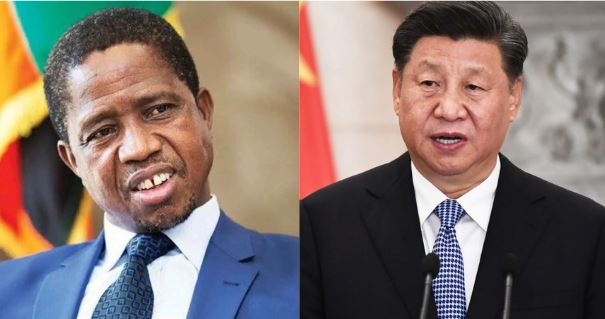Zambia President Edgar Lungu on Monday had a telephonic conversation with Chinese President Xi Jinping where the former called for some debt-relief measures in the wake of a global pandemic, which to begin with has been China’s making.
“President Lungu called for debt relief and cancellation in light of reduced revenue due to the negative impact of the pandemic, as well as competing needs for the country, to secure adequate resources to fight the pandemic and to stimulate the economy,” said a statement issued by Zambian spokesman Isaac Chipampe.
However, Xinhua news, the official state-run news agency of China published a report that entirely gobbled up the part of Zambia calling for some debt-relief and instead only published the part where the country said it supports Xi Jinping’s One-China policy.
The CCP owned media agency conveniently cut the part which didn’t suit its narrative and peddled its own agenda. The Xi Jinping regime is in a fix over the debt issue and Zambia knows it and therefore asking for debt relief has put China in a fix. The Chinese state media tried to spin it in a positive way but in doing so exposed itself.
Southern Africa’s third-largest economy, Zambia’s public debt has increased significantly in recent years due to the introduction of China’s ambitious Belt and Roads Initiative in the sub-Saharan country. According to CNBC, official reports had stated the external debt as rising by $10.05 billion at the end of 2018 compared to $8.74 billion a year earlier in 2017.
China happens to be Africa’s biggest lender with debts worth more than $150 billion owed. Overall, in 2019, China’s outstanding debt claims stood at well over $5 trillion.
In the wake of the coronavirus pandemic, African nations are trying to renegotiate the debt payments to China. And although China has paused debt repayment for 77 countries with 40 of them being in Africa, the hidden clauses of these supposedly good samaritan moves are certainly being questioned.
China’s state newspaper Global Times has itself noted that preferential loans such as those by the Export-Import Bank of China (Eximbank), “are not applicable for debt relief.”
The debt-trap policy forms the bedrock of the BRI and China is using it to hash out the assets of the country in lieu of the debts and also extract the support.
The modus-operandi is fairly simple—enter a host country on the pretext of development activities, hand out fishy loans with exorbitant interest rates and when the state fails to repay it, capture the territories by swooping in with debt-equity swaps.
In nutshell BRI projects are cut-off from local economic and developmental needs of the host country and the example of Pakistan in our neighborhood is a shining example of it. CPEC has crippled Pakistan as it is forced to import a lot of capital goods from China that exhausted its already meager foreign reserves.
That being said, the African nations are still pretty much in the grasp of Chinese as was seen during the United Nations Human Rights Council’s (UNHRC) convention in Geneva, Switzerland to vote on the controversial Hong Kong National Security Bill. 53 nations came in support of China and its bill and the majority of the nations were rom Africa.
Therefore it’s a long road but with Zambia playing hard-ball against China, a strong message has been delivered to the other African nations that they shouldn’t succumb easily to the whimsies of the red authoritarian regime.
Other African nations are also slowly but steadily rising up to China. Reported by TFI earlier, a Kenyan appellate court had recently passed a judgment against the USD 3.2 billion Standard Gauge Railway (SGR) project between Kenya government and the China Road and Bridge Corporation (CRBC) under BRI, by calling the contract ‘illegal’. The newly built Chinese railway line, from the port city of Mombasa to the capital, Nairobi had shot up the cost of transportation by 50 percent.
China holds the ‘One China Policy’ very dear to itself and it will go to any length to project immense support for its policies to the world.








